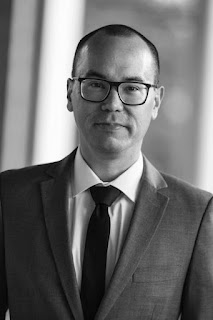Alec Nevala-Lee is the author of the new biography Inventor of the Future: The Visionary Life of Buckminster Fuller. Nevala-Lee's other books include Astounding, and his work has appeared in a variety of publications, including Analog Science Fiction and Fact and Lightspeed. He lives in Oak Park, Illinois.
Q: What inspired you to write this biography of architect
and futurist Buckminster Fuller (1895-1983), and how did you research his life?
A: I’ve been fascinated by him ever since high school, when I first encountered
Fuller and his geodesic domes in the pages of the Whole Earth Catalog.
As a followup to my previous book, Astounding: John W. Campbell, Isaac Asimov, Robert A. Heinlein, and the Golden Age of Science Fiction, Fuller seemed like a natural choice. During his lifetime, he was the most famous futurist in the world, and he offered me the chance to explore some of my favorite themes on a greater scale.
Researching the book involved spending a lot of time in
Fuller’s papers at Stanford—they amount to perhaps the single largest archive
for a private individual in history—and interviewing as many of his surviving
relatives, students, and colleagues as possible. It took me about three years
of nonstop work, which is actually pretty fast for a book of this size and
complexity.
Q: You begin the book with a meeting between Fuller and Steve Jobs. Why did you
decide to start there, and how would you describe the dynamic between the two?
A: It was important for me to connect Fuller with the generation of Silicon
Valley founders embodied by Jobs, and I had originally intended to start with
Fuller’s posthumous appearance in the Apple commercial that introduced the
slogan “Think Different.”
While I was researching the book, I learned from Jobs’s friend Daniel Kottke that the two men had actually met, which was a fact that had never been revealed before in print. It was clearly a fantastic opening for the book, since my central thesis is that Fuller was the prototype for the modern startup founder.
Unfortunately, we don’t know what Jobs and Fuller said to
each other in private. It’s obvious that Jobs was a fan of Fuller, who was
initially less than impressed by the Apple II computer—he said afterward that
he thought it was “a toy,” although he eventually came to see it as the
fulfillment of everything that he had predicted.
Q: In a New York Times review of the book, Witold Rybczynski wrote, “The
strength of this carefully researched and fair-minded biography is that the
reader comes away with a greater understanding of a deeply complicated
individual who overcame obstacles — many of his own making — to achieve a kind
of imperfect greatness.” What do you think of that description?
A: I love that review, and I think that Rybczynski gets at the heart of what I
was trying to do.
Most of the previous books about Fuller present a very idealized, uncritical picture, and I’m no longer interested in that kind of myth. At this point, most of us have started to realize that becoming a figure like Fuller—or Steve Jobs, or Elon Musk—is impossible without some kind of personal cost.
I still think that Fuller is an incredibly useful role model for people who want to produce change, but for his example to be instructive, we need to be honest about the downside, as well as the ways in which he fell short of his own high standards.
My greatest hope is that readers will come away with a
better sense of how and why Fuller accomplished so much, as well as the hidden
consequences of his choices, which went largely unacknowledged during his
lifetime.
Q: How would you describe Fuller's legacy today?
A: You can see Fuller’s influence everywhere—in physical structures like
Spaceship Earth at Epcot Center, in catchphrases like “synergy,” in the cult of
the startup founder—but I also think that he would be surprised by the extent
to which he has fallen out of the conversation.
His values and assumptions have been absorbed by our culture, but Fuller himself isn’t as widely known as he used to be, in large part because he had trouble creating a lasting movement that wasn’t driven by the power of his own personality.
One of my goals in writing this biography was to provide
readers with an accurate portrait that would allow Fuller to be rediscovered by
an audience that hasn’t been served by previous works. I still think that
Fuller’s story is incredibly valuable, and I’d like to think that this book
will encourage people to seek out his ideas firsthand.
Q: What are you working on now?
A: I’ve got a few shorter nonfiction pieces that I’d like to write before
tackling my next project—I wasn’t able to work on much of anything else while I
was writing this book, and there are a lot of other subjects that I’ve been
meaning to tackle.
After that, I do have an idea for another ambitious
biography that would build on Inventor of the Future, in the same way that
this book builds on Astounding, but I’m not quite ready to reveal the
details yet.
Q: Anything else we should know?
A: Although the more critical aspects of this book have received a lot of
attention, I want to make it clear that I admire Fuller, and I think that
nearly everyone would benefit from knowing more about his work. He had a huge
positive impact on my life, and I’d like nothing better than for this book to
introduce him to a new generation of fans.
--Interview with Deborah Kalb


No comments:
Post a Comment